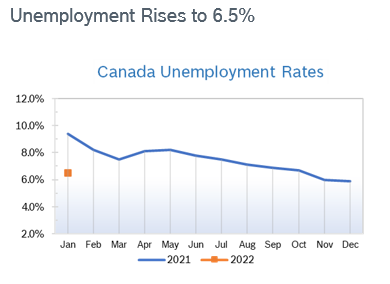Consumer Prices Rise 4.8% The Consumer Price Index (CPI) rose 4.8% year over year in December, up slightly from the increase in November and October. It was the largest year-over-year increase since 1991, according to Statistics Canada. It was the ninth consecutive month that inflation has exceeded the Bank of Canada’s target range of 1% to 3%. Supply chain disruptions, extreme weather events and labour shortages all contributed to the increase. Shelter costs jumped 5.4% in 2021 and home and mortgage insurance costs jumped 9.3%, which may have been due to the increase and severity of weather-related claims due to fires and flooding. The average of the Bank of Canada’s core measures of annual inflation, which strip out extreme price swings and give a better sense of underlying trends, rose to 2.9%, the highest since 1991. Interest Rates Steady for Now The BoC mirrored the Fed and kept interest rates at 0.25% at its first meeting of the year in January but signaled that it will begin to raise rates soon. The BoC stated that the economy has returned to full capacity and now the priority is getting inflation back under control. Consumer prices rose an average of 4.2% in 2021, well ahead of forecast. The bank expects to implement a series of quarter-point rate increases this year and have inflation at about 3% by the end of this year and 2.5% by mid-2023. Economists are projecting three increases this year. Housing and Construction News The annual pace of housing starts fell 22% in December to 236,106 units, with urban starts falling 24%, according to Canada Mortgage and Housing Corporation (CMHC). The six-month moving average of the monthly seasonally adjusted annual rate of housing starts was 260,567 in December, down from 267,606 in November. Starts for November were revised up. Canada had the lowest supply of existing homes available for purchase on record in January, according to the Canada Real Estate Association (CREA). December marked the slowest pace of new construction since December 2020, but single-family home and multifamily home construction increased 28% and 19% respectively last year after CV19 shutdowns depressed levels in 2020. The December pullback could add to concerns over the housing market's ability to sustain price increases at its current pace. Home prices have skyrocketed as the existing supply of homes on the market has shrunk while demand has grown. CREA reported that the national average price of a home was $811,700 in December after adjusting for price volatility, a 26.6% jump from the year before. Policy-makers are already gearing up to tackle what some deem a housing crisis. In the last federal budget, Prime Minister Justin Trudeau's government outlined $2.5 billion to speed up and support 35,000 affordable housing units. Annual home sales reached a new high in 2021, eclipsing the previous record set in 2020 by about 20%, according to CREA. The association says about 667,000 residential properties changed hands in 2021, about 30% more than the 10-year average. However, home sales in December were little changed from November as they rose 0.2% on a seasonally-adjusted basis. On a non-seasonally-adjusted basis, CREA says sales in December totaled 35,971, down nearly 10% from December 2020. Retail Sales Retail sales rose 0.7% to $58.1 billion in November after rising to $57.6 billion in October. Sales increased in 6 of 11 subsectors, representing 63.8% of retail trade. Core retail sales, which exclude gasoline stations and motor vehicle and parts dealers, increased 0.5%. In volume terms, retail sales were up 0.2% in November. In November, severe flooding in British Columbia and the Atlantic provinces damaged infrastructure and led to evacuations in affected regions, resulting in major disruptions to the business operations of retailers across the country. Sales at building material and garden equipment and supplies dealers rose 3.0%. It was the fourth consecutive monthly increase in sales for this segment, following four months of declines from April to July 2021. Sales were up in seven provinces, led by higher sales in Quebec. Retail Ecommerce Sales Fall On a seasonally adjusted basis, retail ecommerce sales fell 3.5% in November after falling 0.9% in October. On an unadjusted basis, retail ecommerce sales were up 1.1% year over year to $4.3 billion in November, accounting for 6.9% of total retail trade. The share of ecommerce sales out of total retail sales fell 0.4% compared with November 2020, coinciding with limited Cyber Monday sales at retailers amid supply chain constraints in November 2021. Retail Notes BMO Financial Group has teamed up with PLATO, Canada's only Indigenous-led and staffed IT services and training firm, to offer the Amazon Web Services (AWS) re/Start program virtually to Indigenous students across Canada. Twenty-two students, some from remote communities, have started a 12-week Cloud computing boot camp which will be followed by a six-month BMO internship to learn and apply those skills on the job, and opportunities for full-time employment. AWS re/Start is a skills development program that prepares individuals for a career in technology with the mission of building a pipeline of talent with core Cloud and Cloud-adjacent skills that are transferable to multiple technology roles. The people participating in this program with PLATO and BMO were selected from a pool of First Nations, Métis, and Inuit applicants from across Canada who demonstrated a strong interest in technology. © Robert Bosch Tool Corporation. All rights reserved, no copying or reproducing is permitted without prior written approval.
Comments are closed.
|
Archives
July 2024
|








